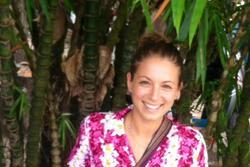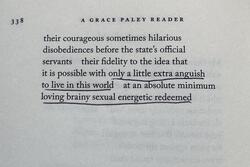Covering
I struggle with my Jewishness. I always have. The world is riddled with conflict, much of which is derived from the infuriating, irreconcilable differences in fundamental religious beliefs. I was brought up in a Jewish home and a Jewish community, read Jewish stories, and absorbed Jewish values. I never felt connected to the idea of God, but all that stuff about honoring thy mother and father and being kind to thy neighbor? I was down with that! Still, I reasoned that humanity would be far better off without such divisive religious constructs, and that our religions should be relegated to history books.
In my early twenties, I read the book 'Covering: The Hidden Assault on Our Civil Rights’ by Kenji Yoshino. The content stuck with me, but I became especially fixated on the weighty title, turning it over again and again in my mind. The word 'covering' describes the way minorities protect themselves by shielding elements of their personal identity. I realized with a start that I did this, quite often in fact.
Thinking about covering, a decade’s worth of moments when I’d been defensive about my Jewish identity surfaced. When my religion or my relationship to Judaism came up in a conversation, particularly with non-Jews, I minimized it: "Yeah I'm Jewish but I celebrate Christmas with my dad's side of the family." "I was raised Jewish, but I don't really believe in any religion." In college, when a friend discovered I taught Hebrew school weekly, the words “Wow, that’s soooo Jewish,” escaped her lips. Too slow and nervous to come up with a response, I’m pretty sure I shrugged it off with a “Yeah, I mean, it’s just to earn some extra money.”
I continually deflected these comments without addressing the real issue: the misconceptions many people had about Jews and my discomfort with having these conversations. The more I refused to acknowledge others’ biases and my own insecurity, the more they ate away at me, and the more I began to respond with avoidance, denial, and deep insecurity.
Why have I done this for years? Why in circles that are increasingly accepting of differences do I often feel vulnerable identifying as Jewish?
It's been particularly interesting to observe how I cover here in Thailand.
In my small, rural Thai community, Buddhism reigns as a truly a pervasive part of the culture. My neighbors wake up daily to prepare food to donate to the monks. Children attend schools at or near to the temples, where one of their subjects of study is Buddhist philosophy. They recite lines in Buddhism’s liturgical language, Pali, every morning as they stand before the Thai flag. All life cycle events (births, deaths, weddings, coming of age) are presided over by monks in orange robes.
Almost immediately after moving in with my first host family, I was asked what my religion was. My honest response (“Judaism!”) was met with blank stares, courtesy of the language barrier. What happened next explains why I tread cautiously when asked about religion by new people I meet here. My host aunt pulled out a smartphone and asked me to type the word I was saying into a translator.
“Stingy”. I stared at the word incredulously, words escaping me. Many silent moments passed, and then it was over.
Sweat beaded on my forehead as the frustration of being unable to clarify burned in my chest. Since then, my Jewish identity has been locked in an obscure part of my consciousness where it’s been collecting dust. To cover was easier than the ominous task of reconstructing preconceptions my Thai peers have about what a Jew is.
My go-to response after the ‘stingy’ incident became, “I don’t practice a religion.” Once in a fit of frustration I explained in Thai to my host mom with questionable accuracy that my mom came from Jews and my dad came from a Christian and an atheist, so she could just figure it out on her own. In the months since, I’ve adopted another, perhaps more accurate answer:
“It’s complicated.”








Oh man, that is an awful translation! You have to wonder at the person who wrote it--whether they were hateful or just grabbed bad information in a hurry. I've sometimes had to explain Judaism to people who were misinformed, but never to someone who had no frame of reference. I'd have been flummoxed, too! (I think the closest I ever got to your situation was someone who said, "Oh, you're like Christians except you don't believe in God, right?") I think if I had to give a quick explanation to someone with a big language/cultural barrier, I'd say, "Judaism is a religion that's thousands of years old. We believe there's one God, and we believe God gave us rules for how to treat people with kindness and how to live in the world." But that might not be what's central for you (and as the joke goes, two Jews, three opinions!). In the months since, have you had any thoughts about what's at the heart of Judaism for you?